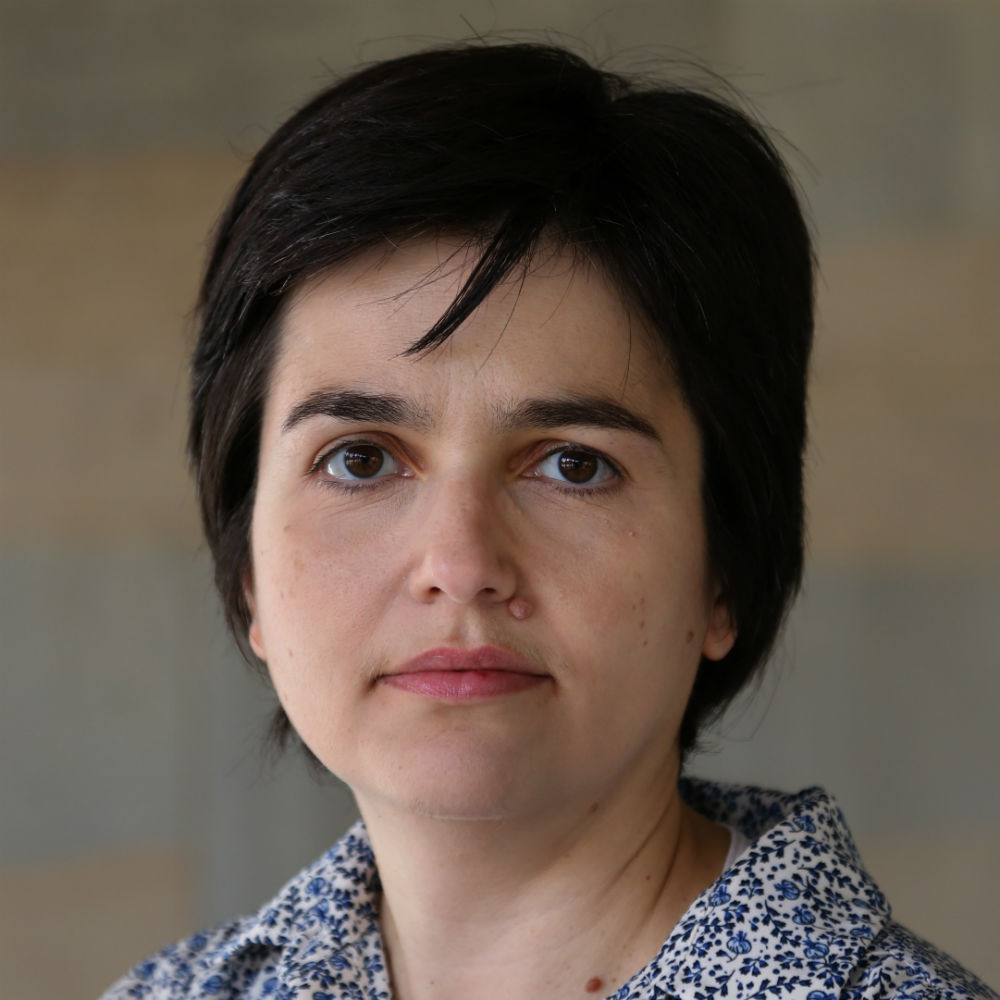Dr Sophia Skoufaki

-
Email
sskouf@essex.ac.uk -
Location
Colchester Campus
-
Academic support hours
Monday 13:00-15:00
Profile
Biography
Sophia did her undergraduate studies in English at the University of Athens, Greece. She then did an MPhil and a PhD in Applied Linguistics at the University of Cambridge. Before coming to Essex, she worked as a lecturer in linguistics at the University of Greenwich and the Open University in the UK. She also conducted postdoctoral research on English learner corpus data at National Taiwan University. Between her degrees she worked as an English language teacher in Athens and in Cambridge and as an item writer for ASSET Languages, a language testing company in Cambridge. Her main research interest is the learning, teaching, and use of vocabulary in a second language. In her PhD research, she examined the comprehension, learning and teaching of English idiomatic expressions. While working as a postdoctoral researcher, she examined the role of vocabulary in second language oral fluency and writing quality. Her postdoctoral research is related to language testing because the data examined were past answers to a local proficiency examination. Sophia's current research examines a) English academic vocabulary learning and teaching and b) how people come to perceive a text as coherent or not.
Qualifications
-
BA National and Kapodistrian University of Athens,
-
MPhil University of Cambridge,
-
PhD University of Cambridge,
Appointments
University of Essex
-
Lecturer, Language and Linguistics, University of Essex (1/11/2010 - 30/6/2020)
-
Consortium for the Humanities and the Arts South-east England (CHASE) Departmental Lead, Language and Linguistics, University of Essex (7/10/2019 - 30/6/2020)
-
Director of Research Students, University of Essex (1/9/2019 - 2/1/2020)
-
Assistant Director of Research Students, University of Essex (1/10/2018 - 30/6/2020)
-
Director BA English language with Media Communication, Language and Linguistics, University of Essex (8/10/2018 - 30/6/2020)
-
Deputy Director of Education (Linguistics), University of Essex (1/1/2019 - 27/6/2019)
-
Undergraduate Admissions Coordinator (Linguistics), University of Essex (1/10/2014 - 5/4/2018)
-
Disability Liaison Officer, University of Essex (1/10/2011 - 30/9/2014)
-
Assistant Undergraduate Admissions Coordinator (Linguistics), University of Essex (1/9/2011 - 1/10/2014)
-
Director BA English language and Literature, Language and Linguistics, University of Essex (10/10/2011 - 30/6/2020)
-
Director BA English language and Sociology, Language and Linguistics, University of Essex (10/10/2011 - 30/6/2020)
-
Director BA English language and History, Language and LInguistics, University of Essex (10/10/2011 - 30/6/2020)
Other academic
-
Postdoctoral Research Fellow, Graduate Institute of Linguistics, National Taiwan University (1/9/2008 - 31/7/2010)
-
Lecturer, Department of Languages and International Studies, University of Greenwich (3/9/2007 - 29/8/2008)
-
Associate Lecturer, Faculty of Education and Language Studies, Open University (7/1/2007 - 30/9/2008)
-
Visiting Lecturer, Department of Languages and International Studies, University of Greenwich (2/10/2006 - 31/5/2007)
Research and professional activities
Research interests
Second language vocabulary learning, teaching, and use
Figurative language processing
Coherence in second language writing
Current research
Knowledge of English polysemous academic vocabulary
I am examining native and non-native undergraduate students knowledge of the meanings that English polysemous academic words have. This project is conducted in collaboration with Dr Bojana Petric (Birkbeck, University of London), Mr Weizhong Wu (Beihang University, China), and Dr Reka Jablonkai (University of Bath).
Coherence in EFL writing: EFL teachers' assessment practices and conceptualisations
I am examining teachers’ conceptualisations of coherence in writing and how they go about providing feedback and marking EFL learners’ writing for coherence. I am the PI and Dr Chinedu Osuji (Federal College of Education, Yola, Nigeria) and Dr Tracey Costley (University of Essex) are my collaborators.
Conferences and presentations
English academic vocabulary: recent research and future directions.
Invited presentation, Keynote presentation, 23rd National Conference on Linguistics, National Chengchi University, Taiwan, Province of China, 28/10/2022
Investigating the role of linguistic knowledge in the test-taking strategies used in a test of polysemous academic words.
Linguistics and Knowledge about Language in Education (LKALE) British Association for Applied Linguistics Special Interest Group 2021 event, University of Glasgow, 7/5/2021
Delineating polysemy in English academic vocabulary: a lexicographic and corpus analysis
Third International Conference on Corpus Analysis in Academic Discourse 2019 (CAAD’19), Castelló de la Plana, Spain, 14/11/2019
Let's talk business! Looking into the meaning senses of English academic words in Business journal articles
Invited presentation, Invited talk at the University of Central Lancashire, Preston, United Kingdom, 30/10/2019
Examining polysemy in English academic vocabulary
British Association of Applied Linguistics 2019 conference, Manchester, Manchester, United Kingdom, 30/8/2019
Investigating pre-sessional EAP students’ exposure to polysemous academic words.
BAAL Language Learning and Teaching SIG conference, Bath, United Kingdom, 28/6/2019
What are cognates? And what good are they for bilinguals?
Festival of Social Science, Colchester, United Kingdom, 3/11/2018
Skoufaki, S., Petric, B., and Chatsiou, K. (2018) Polysemous academic English vocabulary in an English for academic purposes presessional course. Exploring Language Education: Global and Local Perspectives conference. Stockholm, 18-20 June 2018.
Exploring Language Education (ELE): Global and Local Perspectives, Stockholm, Sweden, 20/6/2018
Skoufaki, S., Petric, B., and Chatsiou, K. (2017) British students' knowledge of polysemous academic English vocabulary. BAAL Vocabulary Studies SIG conference, Reading, 3-4 July 2017.
Reading, United Kingdom, 2017
Skoufaki, S. and Petric, B. (2017) An examination of British students knowledge of polysemous academic English vocabulary. 'Innovations in English for Academic Purposes (EAP) assessment' BAAL Testing, Evaluation and Assessment SIG 2017 conference, Northampton, 31 March 2017.
Northampton, United Kingdom, 2017
Skoufaki, S. (2016) Delineating the subjectivity of coherence-error intuitions: an application of Rhetorical Structure Theory to identify coherence errors in an English learner corpus. IWoDA16 Fourth International Workshop on Discourse Analysis, Santiago de Compostella, 29-30 September 2016.
Santiago de Compostela, Chile, 2016
Teaching and supervision
Previous supervision

Degree subject: Applied Linguistics
Degree type: Doctor of Philosophy
Awarded date: 28/8/2024

Degree subject: English Language Teaching
Degree type: Doctor of Philosophy
Awarded date: 28/7/2020

Degree subject: Applied Linguistics
Degree type: Doctor of Philosophy
Awarded date: 29/7/2019

Degree subject: Applied Linguistics
Degree type: Doctor of Philosophy
Awarded date: 7/9/2018

Degree subject: Applied Linguistics
Degree type: Doctor of Philosophy
Awarded date: 5/7/2017

Degree subject: English Language Teaching
Degree type: Doctor of Philosophy
Awarded date: 11/4/2016

Degree type: Doctor of Philosophy
Awarded date: 25/2/2016
Publications
Journal articles (10)
(2024). Insights and Innovations: An Interview with Averil Coxhead on Teaching and Learning Academic Vocabulary. International Journal of TESOL Studies. 6 (2), 109-116
(2024). Introduction to the Special Issue on Teaching and Learning of Academic Vocabulary in EMI Contexts. International Journal of TESOL Studies
Perez Urdaniz, R. and Skoufaki, S., (2022). Spanish L1 EFL learners’ recognition knowledge of English academic vocabulary: the role of cognateness, word frequency and length. Applied Linguistics Review. 13 (4), 661-703
Skoufaki, S. and Petrić, B., (2021). Academic vocabulary in an EAP course: Opportunities for incidental learning from printed teaching materials developed in-house. English for Specific Purposes. 63, 71-85
Skoufaki, S. and Petrić, B., (2021). Exploring polysemy in the Academic Vocabulary List: A lexicographic approach. Journal of English for Academic Purposes. 54, 101038-101038
Skoufaki, S., (2020). Rhetorical Structure Theory and coherence break identification. Text and Talk: an interdisciplinary journal of language, discourse and communication studies. 40 (1), 99-124
Skoufaki, S., (2017). Review of Academic Vocabulary in Learner Writing: From Extraction to Analysis, Magali Paquot. Continuum, New York/London (2010). Journal of English for Academic Purposes. 30, 96-97
Skoufaki, S., (2009). An Exploratory Application of Rhetorical Structure Theory to Detect Coherence Errors in L2 English Writing: Possible Implications for Automated Writing Evaluation Software. International Journal of Computational Linguistics & Chinese Language Processing: Special issue in Computer Assisted Language Learning. 14 (2), 181-203
Skoufaki, S., (2008). Investigating the Source of Idiom Transparency Intuitions. Metaphor and Symbol. 24 (1), 20-41
Skoufaki, S., (2007). The Extent of the Literal: Metaphor, Polysemy and Theories of Concepts (review). Language. 83 (1), 227-228
Books (1)
Hall, D., Markopoulos, T., Salamoura, A. and Skoufaki, S., (2003). CamLing 2003: Proceedings of the University of Cambridge First Postgraduate Conference in Language Research, 26 April 2003.. Cambridge Institute of Language Research. 0954659805. 9780954659806
Book chapters (8)
Skoufaki, S., Chen, HKY., Huang, C-R., Cheng, W., Cheung, H., Harada, Y. and Hong, H., English Learner Corpus: Global Perspectives with an Asian Focus.. In: A New Look at Language Teaching and Testing: English as Subject and Vehicle.. 9-789572-876428
Skoufaki, S., (2021). English academic vocabulary teaching and learning.. In: Research questions in language education: a reference guide for teachers.. Editors: Coombe, C. and Mohebbi, H., . Springer. 45- 49. 9783030791421
Skoufaki, S., (2013). Devising a discourse error tagging system for an English learner corpus.. In: Second language Reading and Writing: Investigations into Chinese and English.. Editors: Wible, D. and Reynolds, BL., . National Central University Press. 67- 93. 9789860368567
Cheung, H., Chung, S. and Skoufaki, S., (2010). Indexing second language vocabulary in the Intermediate GEPT. In: Proceedings of the Twelfth Academic Forum on English Language Testing in Asia (Language Testing in Asia: Continuity, Innovation and Synergy). Language Training and Testing Center. 118- 136
Skoufaki, S., (2009). Formulaic language and pauses in the speech of Taiwanese learners of English.. In: Proceedings of the 2009 International Conference on Applied Linguistics and Language Teaching. Crane Publishing Co., Taiwan. 190- 202
Skoufaki, S., (2008). Conceptual metaphoric meaning clues in two idiom presentation methods. In: Cognitive Linguistic Approaches to Teaching Vocabulary and Phraseology. Mouton de Gruyter. 101- 132. 9783110196306
Skoufaki, S., (2005). Use of conceptual metaphors: A strategy for the guessing of an idiom’s meaning?. In: Selected Papers on Theoretical and Applied Linguistics from the 16th International Symposium, April 11-13, 2003. Editors: Mattheoudakis, M. and Psaltou-Joycey, A., . Department of Theoretical and Applied Linguistics, School of English, Aristotle University. 542- 556
Skoufaki, S., (2003). Determinants of idiom-transparency intuitions. In: CamLing 2003: Proceedings of the University of Cambridge First Postgraduate Conference in Language Research, 26 April 2003. Editors: Hall, D., Markopoulos, T., Salamoura, A. and Skoufaki, S., . Cambridge Institute of Language Research. 253- 259. 0954659805. 9780954659806
Conferences (1)
Skoufaki, S. and Petrić, B., Academic vocabulary in an English for Academic Purposes course
Contact
Academic support hours:
Monday 13:00-15:00
